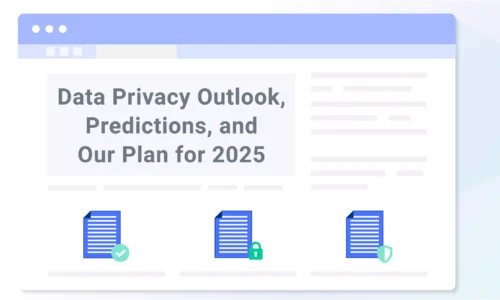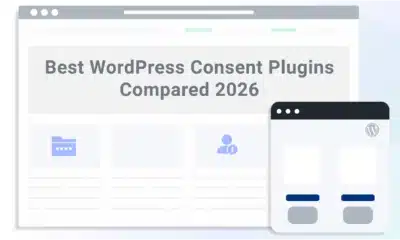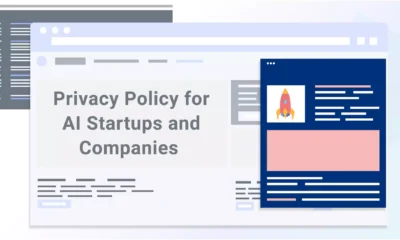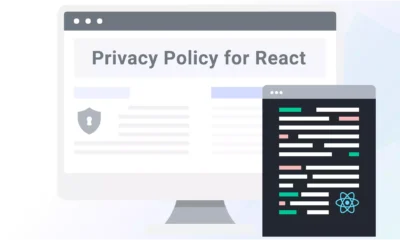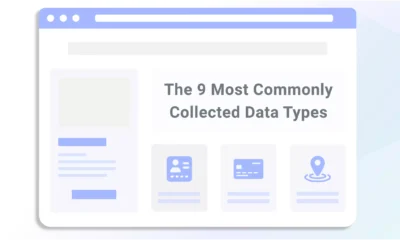A new year means it’s time to reflect on the past year and give our privacy outlook, predictions, and plans for 2025!
In 2024, artificial intelligence technology took off at a rapid pace, several U.S. state-level privacy laws entered into force, and European lawmakers passed the EU AI Act.
But what will 2025 bring?
Below, I look back at data privacy trends from 2024, look forward to predict what might happen in 2025, and give insights into Termly’s plans to help businesses keep up with compliance.
A Look Back at Data Privacy in 2024
Before looking ahead, let’s reflect back on what happened in the data privacy industry in 2024.
U.S. Data Privacy Laws from 2024
In the U.S., four different states had data privacy laws take effect in 2024:
- Florida Digital Bill of Rights (FDBR)
- Oregon Consumer Privacy Act (OCPA)
- Montana Consumer Data Privacy Act (MCDPA)
- Texas Data Privacy and Security Act (TDPSA)
In 2023, there were only five enforceable state-level privacy laws, which means the total number has nearly doubled in a single year.
I predict this trend won’t stop anytime soon, as eight more privacy laws are scheduled to take effect in 2025.
Increasing UOOM Requirements
Universal opt-out mechanisms, like Global Privacy Control (GPC), automatically let consumers communicate opt-out preferences on their browsers.
Businesses under California or Colorado privacy laws were required to start honoring UOOMs in 2024.
The Colorado Attorney General (AG) even provided technical requirements for universal opt-out mechanisms (UOOMs), as required by the Colorado Privacy Act (CPA).
The AG provided a short-list of applicants to be included on the final list of UOOMs that are recognized as meeting the standards of the CPA.
The global opt-out applies to Colorado consumers’ right to opt out of the sale of their data and targeted advertising.
EU AI Act
In 2024, European lawmakers passed the EU AI Act, becoming the first law to regulate artificial intelligence technologies.
It took effect on August 1, 2024 and aims to promote responsible development and use of artificial intelligence within the EU by separating AI technologies into different risk categories:
- Minimal risk
- Specific transparency risk
- High risk
- Unacceptable risk
Google, Ad Publishers, and CMPs that Support the IAB EU’s Transparency & Consent Framework v2.2
In January 2024, Google began requiring all ad publishers serving ads to users in the EEA and the UK to use a Consent Management Platform (CMP) meeting the requirements of the Transparency and Consent Framework v2.2 (TCF).
Google’s new requirements highlight the importance of compliant consent management when it comes to using consumer data for marketing and advertising purposes.
The TCF was created by the European branch of the Interactive Advertising Bureau (IAB) to help businesses respect EU privacy laws.
Businesses can implement this voluntary framework to assist with serving digital ads to EU users while honoring laws like the GDPR and ePrivacy Directive.
Termly’s CMP fully support the IAB TCF v2.2 and is a Google CMP Partner.
A Look Ahead at Data Privacy in 2025
Now, I’ll walk you through what we know will happen in 2025 in the data privacy sector, including highlighting new laws and requirements that will take effect in the new year.
New U.S. State Laws Take Effect
The U.S. will see eight different state-level privacy laws take effect in 2025:
- Delaware Personal Data Privacy Act (DPDPA) — effective January 1, 2025
- Iowa Consumer Data Protection Act (ICDPA) — effective January 1, 2025
- Maryland Online Data Protection Act (MODPA) — effective October 1, 2025
- Minnesota Consumer Data Privacy Act (MCDPA) — effective July 31, 2025
- Nebraska Data Privacy Act (NDPA) — effective January 1, 2025
- New Hampshire Data Privacy Law (NHDPL) — effective January 1, 2025
- New Jersey Data Privacy Act (NJDPA) — effective January 15, 2025
- Tennessee Information Protection Act (TIPA) — effective July 1, 2025
The total number of in-effect U.S. state-level laws will go up from nine to seventeen in 2025.
I expect more states to pass state-level consumer privacy legislation throughout the year, regardless of if a federal law is introduced.
To keep up with the evolving U.S. privacy law landscape, check out our interactive map.
Laws Impacting Universal Opt-Out Mechanisms (UOOMs) Enter Into Force
In 2024, we saw the start of the development of U.S. state laws requiring websites to honor UOOMs and opt-out browser signals, and this trend will continue into 2025.
Several other state laws will also require businesses to recognize browser extensions and global privacy device settings as consumers’ designated, authorized agents concerning their privacy rights, including:
- Montana Consumer Data Privacy Act (MCDPA) — effective January 1, 2025
- Texas Data Privacy and Security Act (TDPSA) — effective January 1, 2025
- Connecticut Data Privacy Act (CTDPA) — effective January 1, 2025
Predictions for Data Privacy in 2025
While I don’t have access to a crystal ball, I have been in the privacy industry long enough to make some educated predictions about what we might see in 2025.
More Laws Proposed to Regulate AI
With the passing and enforcement of the EU AI Act well underway, I expect we’ll see other laws proposed in different parts of the world that are similar in scope and scale to this groundbreaking piece of legislation.
The EU GDPR had a global impact on data privacy, one we still feel to this very day, and it wouldn’t surprise me if we feel the same effects from the world’s first-ever AI regulation.
AI and AI regulation is a pressing topic, which is we added an AI clauses to our Privacy Policy Generator to help our users more easily and accurately address their use of AI and how it handles consumer personal data.
Check back to learn more about what we’re doing to ensure our privacy compliance solutions adequately address these new and evolving technologies.
Increased Importance of Consent Management
In 2025, I predict businesses will need to focus more on implementing compliant consent management solutions for their consumers who are protected by different privacy laws.
Businesses that set up comprehensive consent management platforms on their websites will have an easier time keeping up with this evolving landscape.
When speaking with industry leaders, this topic often comes up as something that’s already impacting marketing teams.
According to Bryan Phillips, the Head of Marketing at In Motion Marketing, “Prioritizing data privacy compliance is essential today, where data privacy functions like currency.”
“With rising regulations, even small lapses can lead to fines and harm customer trust.” — Bryan Phillips, Head of Marketing, In Motion Marketing
Consent is already a significant part of the GDPR, as it’s one of the legal basis businesses can use to lawfully collect and process personal information.
But the eight privacy laws entering into force in the U.S. in 2025 give users various opt-out rights, including the right to opt-out of targeted advertising.
Phillips says, “A practical step is finding affordable, easy-to-use software for handling core needs—like Cookie Consent Banners, Terms & Conditions, and Privacy Policies.”
He adds, “Having the right tool means you’re covered and can focus on what matters most to your business. Getting this wrong can impact ad performance or, worse, lead to legal issues.”
I whole-heartedly agree with Phillips, and this is one of the primary reasons why Termly exists.
Technology Advancements That Help and Hurt
We saw technology advance at a rapid pace in 2024, particularly with respect to AI, and this will likely continue to happen in the new year.
There’s an opportunity for this technology to help streamline data collection, processing, and storage in a way that increases efficiency, accuracy, and even security.
But I believe we’re walking on a tightrope here.
Some of the current AI algorithms use personal data irresponsibly, which could put consumer information at risk of unauthorized access, breaches, or other illegal activity.
My hope is that, as AI becomes more regulated, the security of these platforms also increase.
Termly’s Plans for 2025
My team at Termly is excited about the new year — we have several new developments to look forward to in the near future.
Here’s what you can expect from Termly in 2025.
Termly Services in More Languages
We’ve been working on rolling out more of our features in different languages, including our cookie policy and the website itself. This work will continue into the new year.
Keeping Up With New and Evolving U.S. Privacy Laws
Our legal team has been paying attention to the data privacy legal landscape so we can ensure our solutions remain compliant. Our Privacy Policy Generator will accommodate all U.S. privacy laws entering into force in 2025 before their active dates.
Researching Data Privacy Laws in New Regions
We’re looking at privacy laws from new regions to expand our offerings so we can help businesses in more parts of the world simplify their compliance journey.
Summary
2024 proved to be another eventful year for the data privacy industry, and it doesn’t look like things are slowing down in 2025.
We’ll see a higher number of U.S. state-level privacy laws take effect, we’ll watch how European lawmakers interpret and enforce the EU AI Act, and more websites will be required to honor browser opt-out signals from users.
As your go-to privacy compliance partner, you can trust that Termly will be here to help your business keep up with this fast-paced industry.

